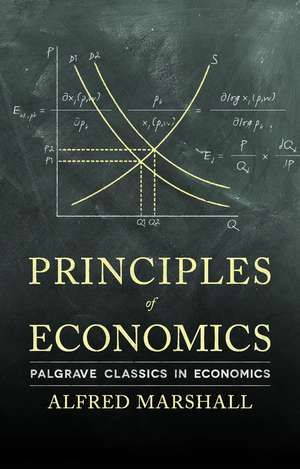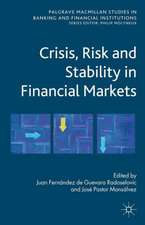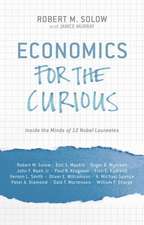Principles of Economics: Palgrave Classics in Economics
Autor A. Marshallen Limba Engleză Paperback – 5 dec 2013
Preț: 365.27 lei
Nou
Puncte Express: 548
Preț estimativ în valută:
69.90€ • 72.71$ • 57.71£
69.90€ • 72.71$ • 57.71£
Carte disponibilă
Livrare economică 24 martie-07 aprilie
Livrare express 08-14 martie pentru 56.27 lei
Preluare comenzi: 021 569.72.76
Specificații
ISBN-13: 9780230249295
ISBN-10: 0230249299
Pagini: 731
Ilustrații: XXVIII, 731 p.
Dimensiuni: 140 x 216 x 41 mm
Greutate: 0.93 kg
Ediția:2013
Editura: Palgrave Macmillan UK
Colecția Palgrave Macmillan
Seria Palgrave Classics in Economics
Locul publicării:London, United Kingdom
ISBN-10: 0230249299
Pagini: 731
Ilustrații: XXVIII, 731 p.
Dimensiuni: 140 x 216 x 41 mm
Greutate: 0.93 kg
Ediția:2013
Editura: Palgrave Macmillan UK
Colecția Palgrave Macmillan
Seria Palgrave Classics in Economics
Locul publicării:London, United Kingdom
Cuprins
BOOK I: PRELIMINARY SURVEY 1. Introduction 2. The Substance of Economics 3. Economic Generalizations or Laws 4. The Order and Aims of Economic Studies BOOK II: SOME FUNDAMENTAL NOTIONS 1. Introductory 2. Wealth 3. Production, Consumption, Labour, Necessaries 4. Income. Capital. BOOK III: ON WANTS AND THEIR SATISFACTION 1. Introductory 2. Wants in Relation to Activities 3. Gradations of consumers' demand 4. The elasticity of wants 5. Choice between different uses of the same thing. Immediate and deferred uses. 6. Value and utility BOOK IV: THE AGENTS OF PRODUCTION. LAND, LABOUR, CAPITAL AND ORGANIZATION T 1. Introductory 2. The Fertility of Land 3. The Fertility of Land, continued. The Tendency to Diminishing Return. 4. The Growth of Population 5. The Health and Strength of the Population 6. Industrial Training. 7. The Growth of Wealth 8. Industrial Organization 9. Industrial Organization, continued. Division of Labour. The Influence of Machinery 10. Industrial Organization, continued. The Concentration of the Specialized Industries in Particular Localities. 11. Industrial Organization, continued. Production on a Large Scale 12. Industrial Organization, continued. Business Management. 13. Conclusion. Correlation of the Tendencies to Increasing and to Diminishing Return BOOK V: GENERAL RELATIONS OF DEMAND, SUPPLY, AND VALUE 1. Introductory. On Markets. 2. Temporary Equilibrium of Demand and Supply 3. Equilibrium of Normal Demand and Supply 4. The Investment and Distribution of Resources 5. Equilibrium of Normal Demand and Supply, continued, with reference to long and short periods 6. Joint and Composite Demand. Joint and Composite Supply 7. Prime and total cost in relation to joint products. Cost of marketing. Insurance against risk. Cost of Reproduction. 8. Marginal costs in relation to values. General Principles. 9. Marginal costs in relation to values. General Principles, continued 10. Marginal costs in relation to agricultural values 11. Marginal costs in relationto urban values 12. Equilibrium of normal demand and supply, continued, with reference to the law of increasing return 13. Theory of changes of normal demand and supply, in relation to the doctrine of maximum satisfaction 14. The theory of monopolies 15. Summary of the general theory of equilibrium of demand and supply BOOK VI: THE DISTRIBUTION OF THE NATIONAL INCOME 1. Preliminary survey of distribution 2. Preliminary survey of distribution, continued 3. Earnings of labour 4. Earnings of labour, continued 5. Earnings of labour, continued 6. Interest of capital 7. Profits of capital and business power 8. Profits of capital and business power, continued 9. Rent of land 10. Land tenure 11. General view of distribution 12. General influences of progress on value 13. Progress in relation to standards of life
Recenzii
"It is impossible to understand economics in the twentieth century without knowing about Marshall's Principles. The simplicity of his presentation conceals complexities that were not apparent to later generations who picked up on the mathematics whilst ignoring many of the evolutionary ideas that fascinate modern scholars."
Roger E. Backhouse, Professor of the History and Philosophy of Economics, University of Birmingham, UK
"Alfred Marshall's Principles of Economics is an outstanding contribution, one of the foundations of neoclassical economics, and shaped the thought of economists from John Maynard Keynes to Milton Friedman. Every modern economist should make its acquaintaince and should look in admiration at that seminal diagram in which Marshall drew a supply curve intersecting a demand curve. Peter Groenewegen, Marshall's biographer and the greatest living Marshall scholar, has written a new introduction for this edition, drawing on a lifetime of insightful scholarship."
Robert W. Dimand, Professor of Economics, Brock University, Canada
Roger E. Backhouse, Professor of the History and Philosophy of Economics, University of Birmingham, UK
"Alfred Marshall's Principles of Economics is an outstanding contribution, one of the foundations of neoclassical economics, and shaped the thought of economists from John Maynard Keynes to Milton Friedman. Every modern economist should make its acquaintaince and should look in admiration at that seminal diagram in which Marshall drew a supply curve intersecting a demand curve. Peter Groenewegen, Marshall's biographer and the greatest living Marshall scholar, has written a new introduction for this edition, drawing on a lifetime of insightful scholarship."
Robert W. Dimand, Professor of Economics, Brock University, Canada
Notă biografică
Alfred Marshall (1842–1924) is widely regarded as the doyen of modern economics and the founder of the Neoclassical School of Economics; he is best known for revolutionising the teaching of economics. In 1865 Alfred Marshall was elected to a fellowship at St John's College, Cambridge, UK, he became a lecturer in moral sciences in 1868 and in 1885 he was awarded Professorship in Political Economy at Cambridge where he remained until his retirement in 1908. Marshall's magnus opus Principles of Economics was first published in 1890 to worldwide acclaim and it cemented his reputation as one of the leading economists of his time.












